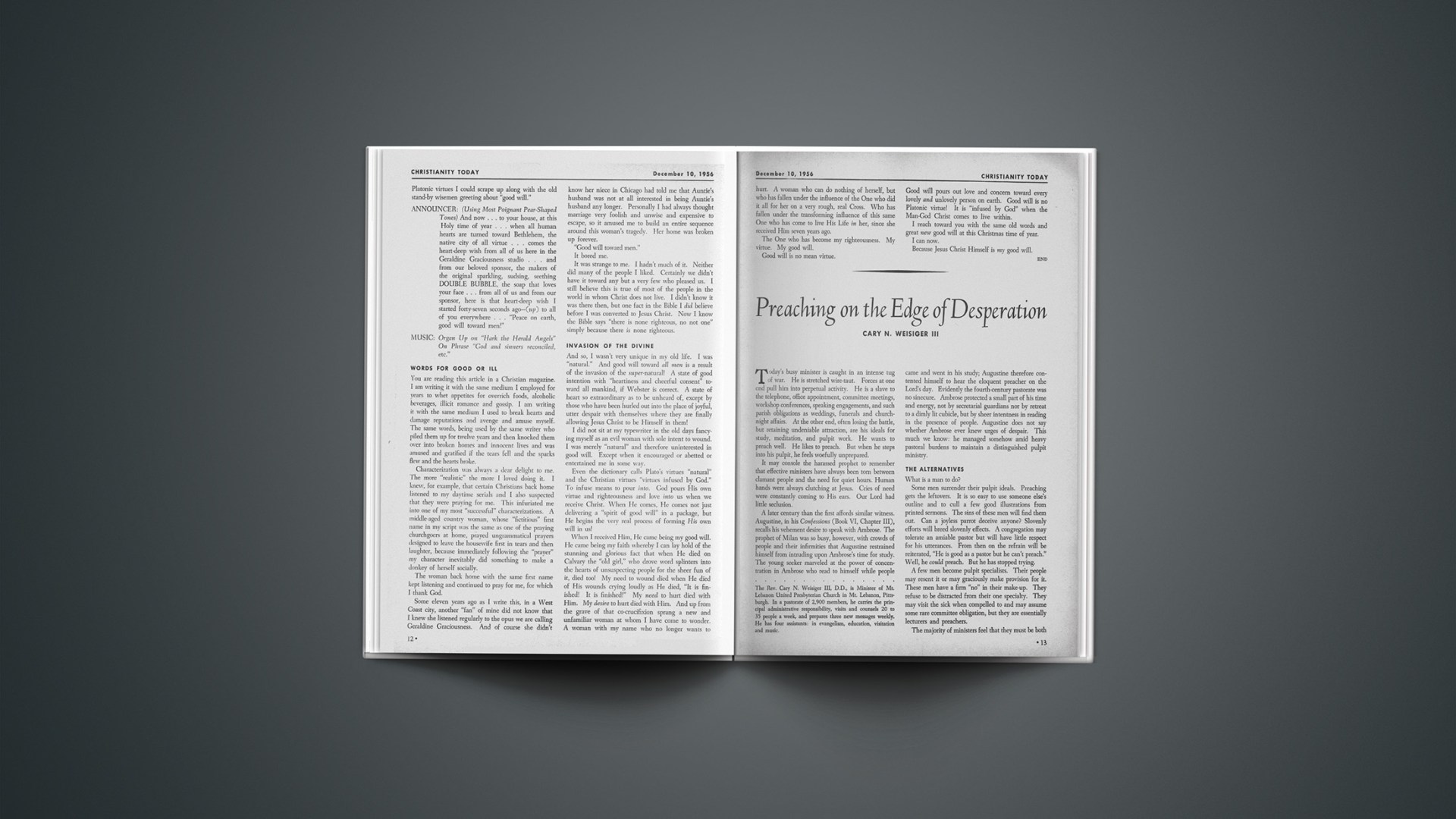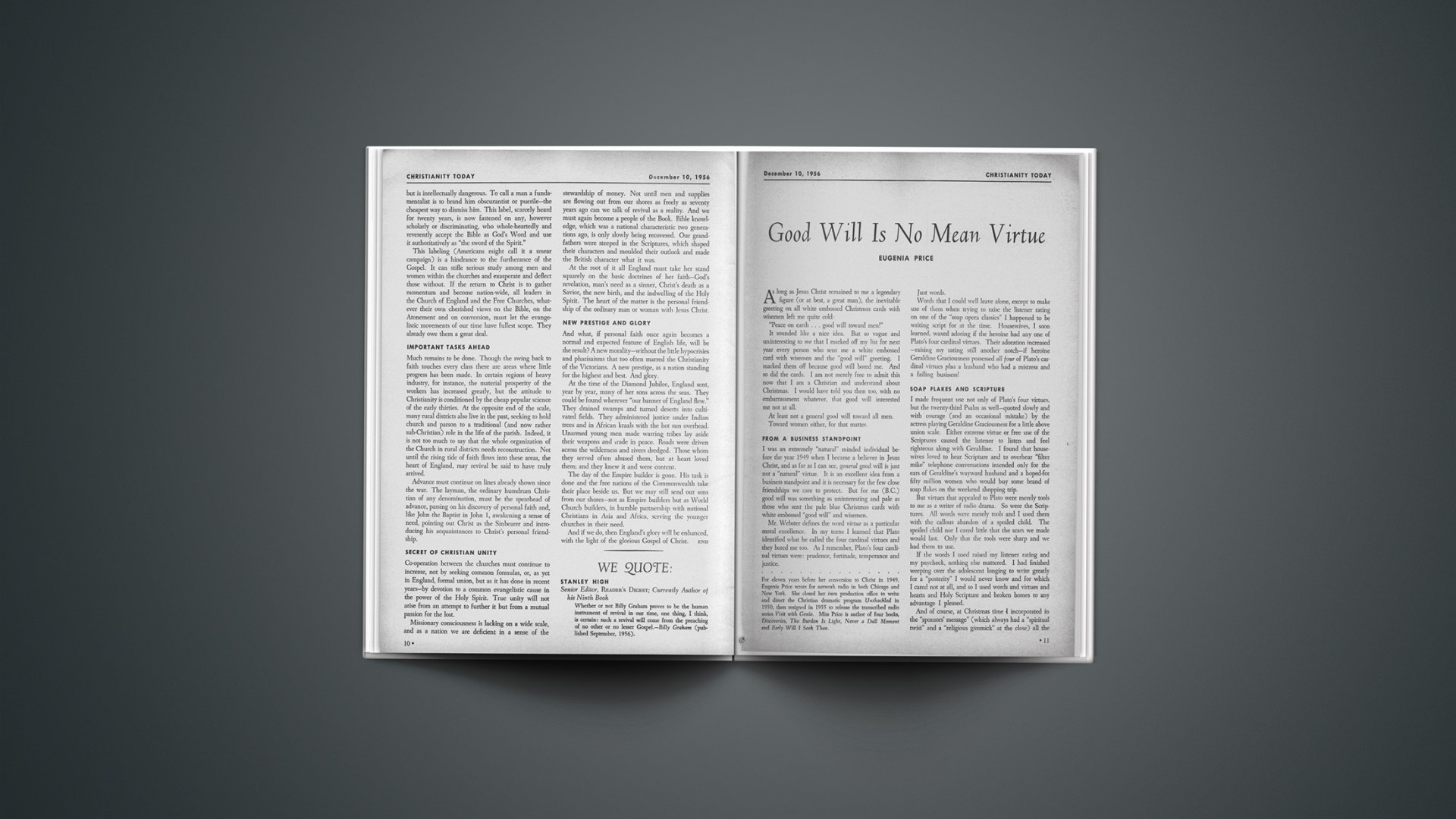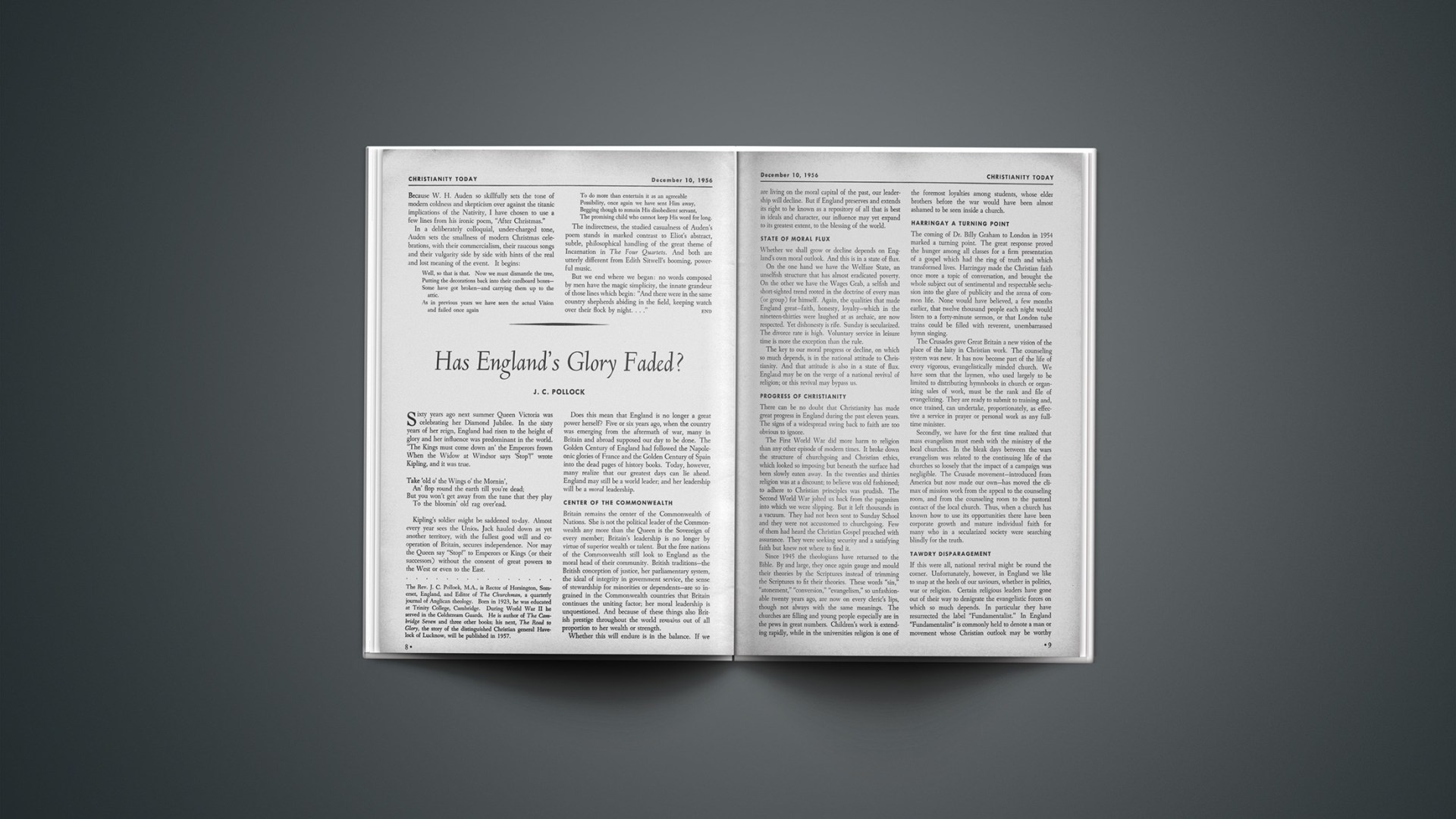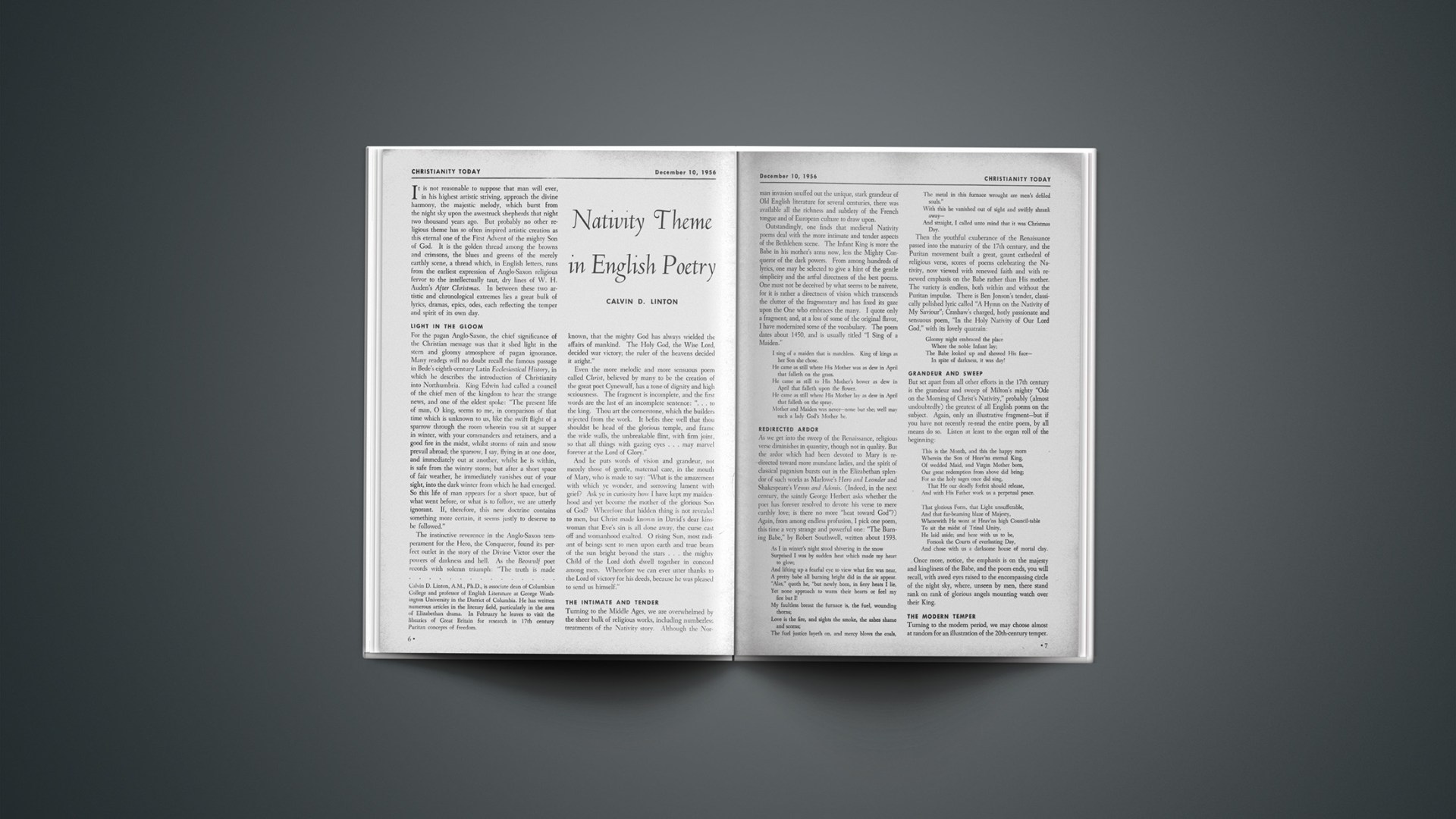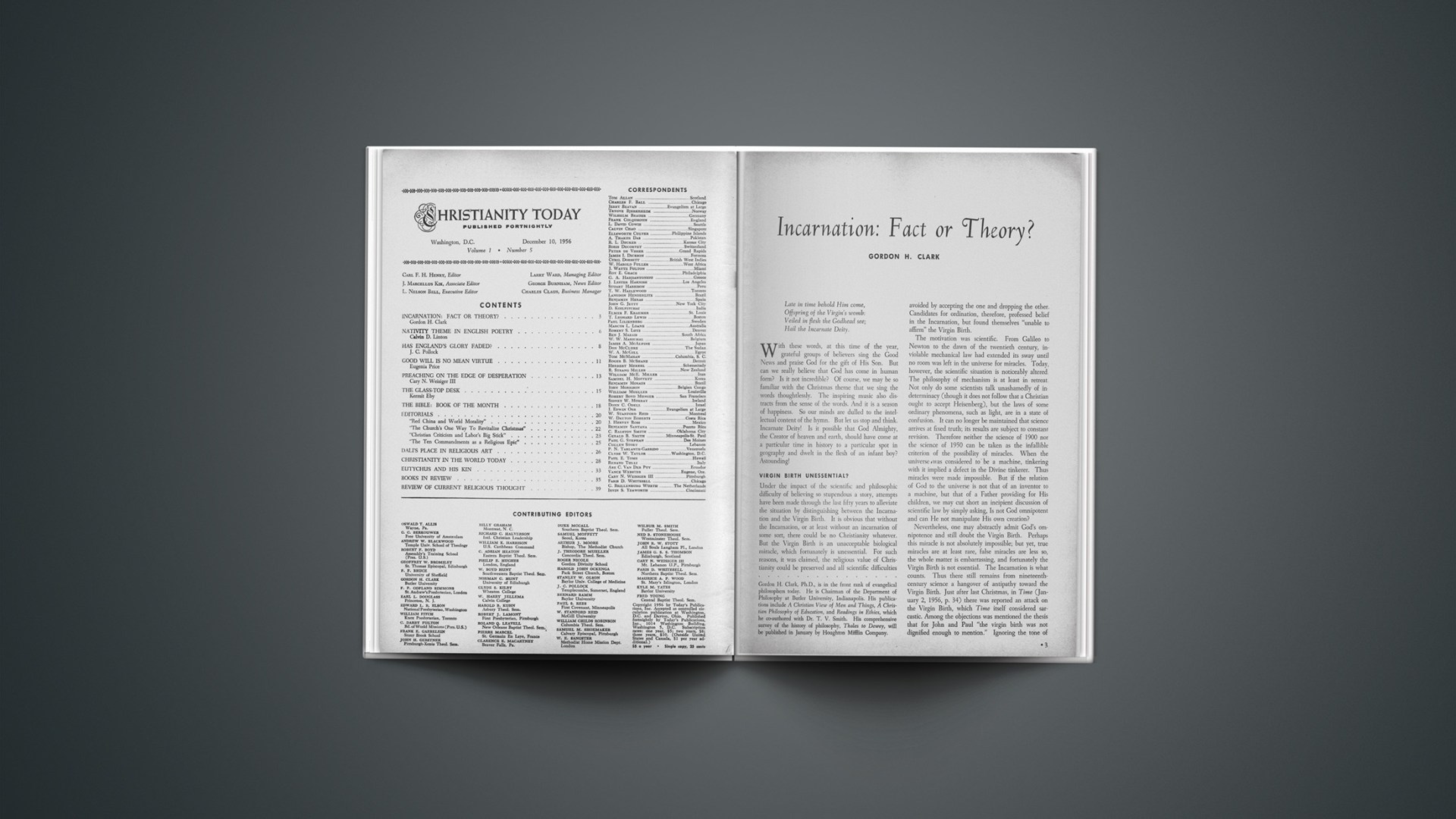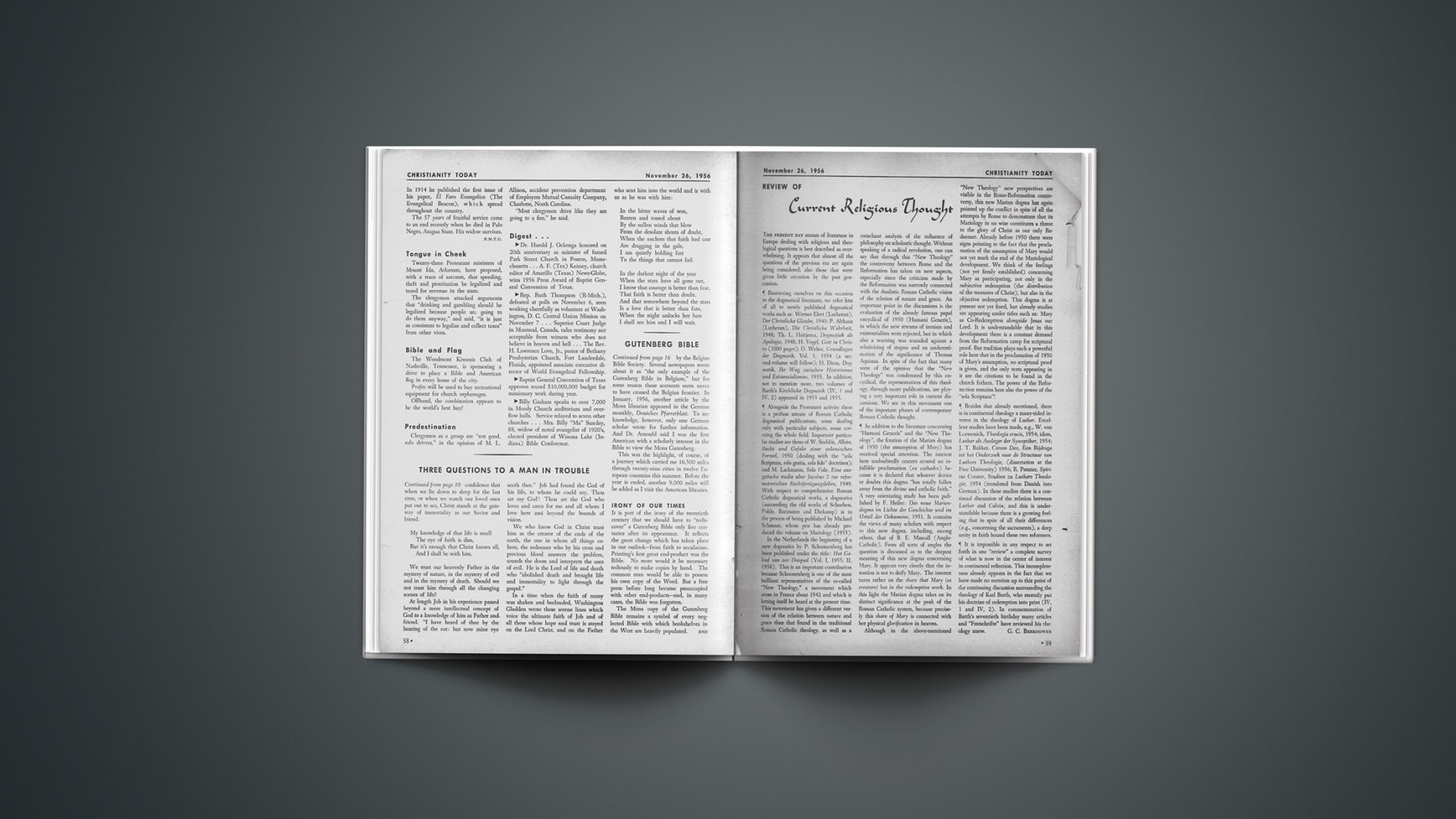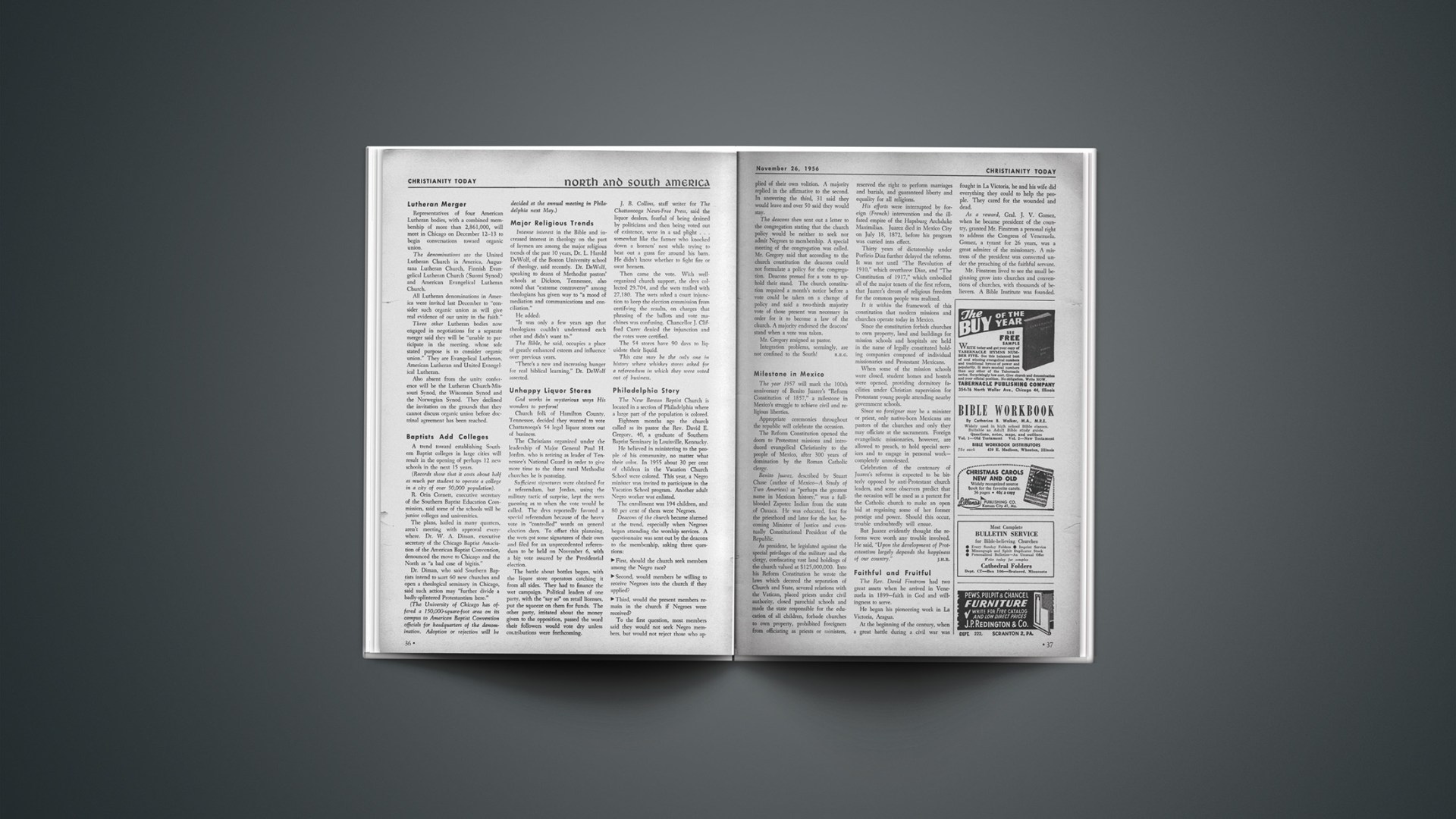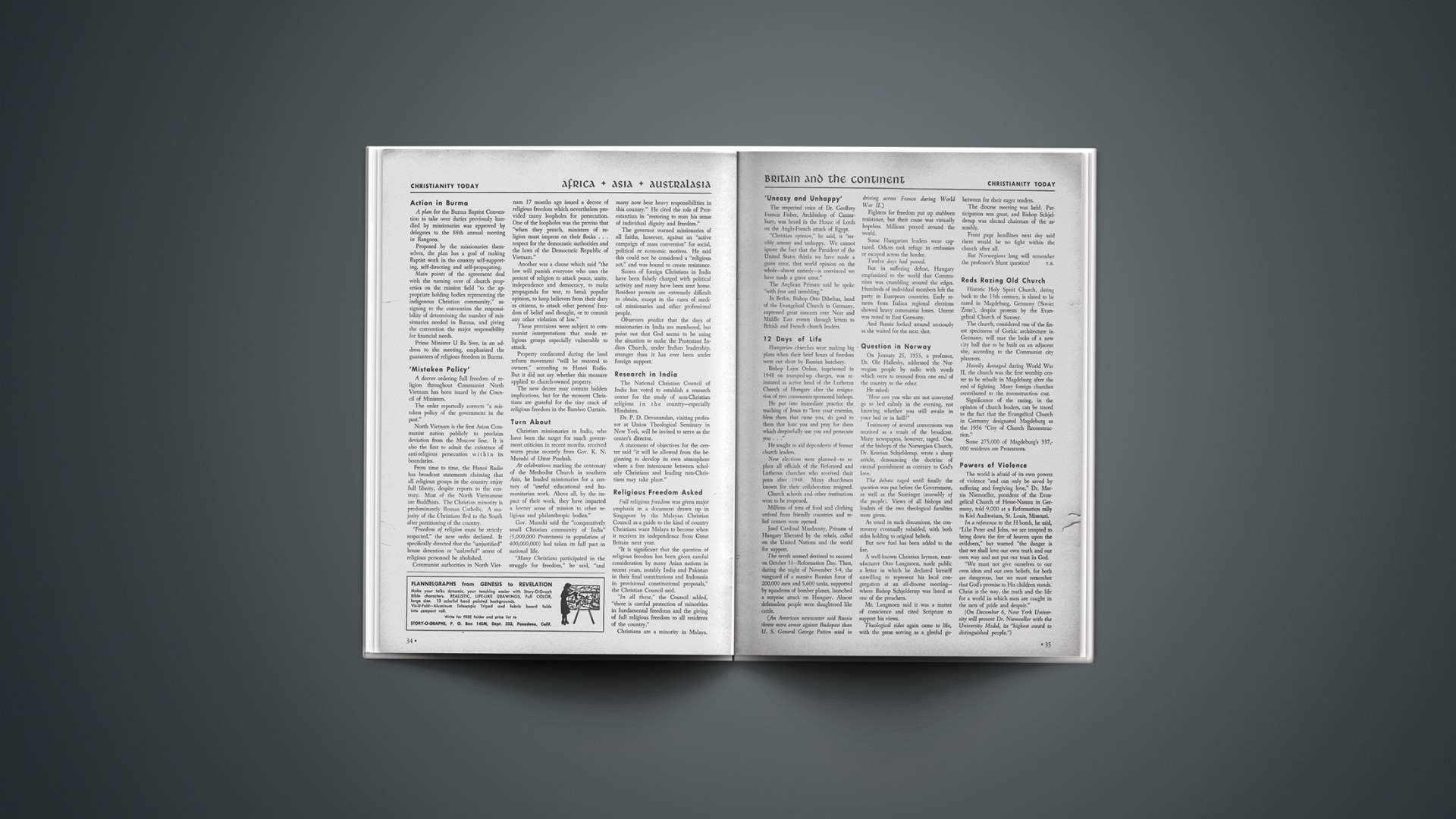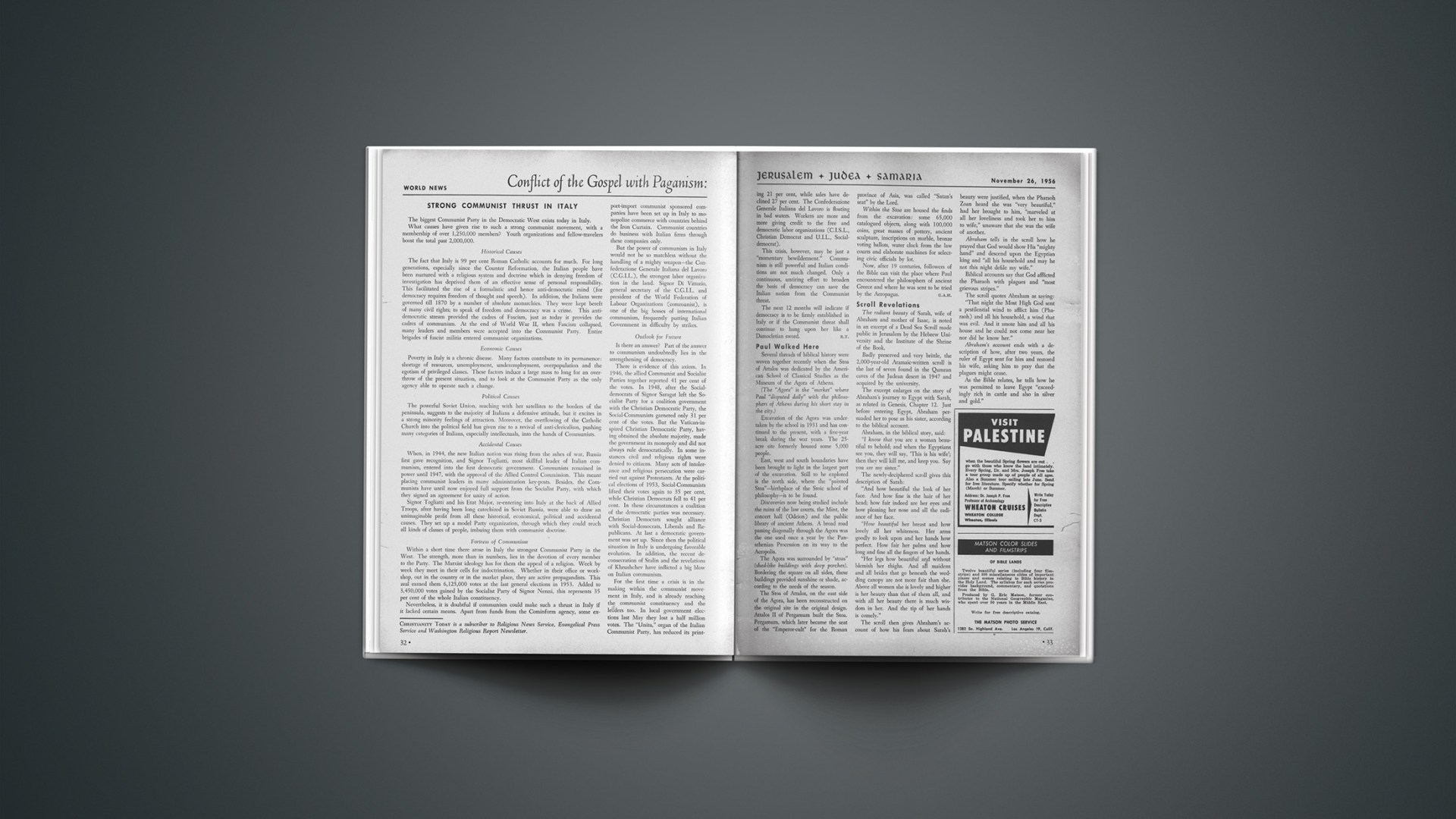Today’s busy minister is caught in an intense tug of war. He is stretched wire-taut. Forces at one end pull him into perpetual activity. He is a slave to the telephone, office appointment, committee meetings, workshop conferences, speaking engagements, and such parish obligations as weddings, funerals and church-night affairs. At the other end, often losing the battle, but retaining undeniable attraction, are his ideals for study, meditation, and pulpit work. He wants to preach well. He likes to preach. But when he steps into his pulpit, he feels woefully unprepared.
It may console the harassed prophet to remember that effective ministers have always been torn between clamant people and the need for quiet hours. Human hands were always clutching at Jesus. Cries of need were constantly coming to His ears. Our Lord had little seclusion.
A later century than the first affords similar witness. Augustine, in his Confessions (Book VI, Chapter III), recalls his vehement desire to speak with Ambrose. The prophet of Milan was so busy, however, with crowds of people and their infirmities that Augustine restrained himself from intruding upon Ambrose’s time for study. The young seeker marveled at the power of concentration in Ambrose who read to himself while people came and went in his study; Augustine therefore contented himself to hear the eloquent preacher on the Lord’s day. Evidently the fourth-century pastorate was no sinecure. Ambrose protected a small part of his time and energy, not by secretarial guardians nor by retreat to a dimly lit cubicle, but by sheer intentness in reading in the presence of people. Augustine does not say whether Ambrose ever knew urges of despair. This much we know: he managed somehow amid heavy pastoral burdens to maintain a distinguished pulpit ministry.
The Alternatives
What is a man to do?
Some men surrender their pulpit ideals. Preaching gets the leftovers. It is so easy to use someone else’s outline and to cull a few good illustrations from printed sermons. The sins of these men will find them out. Can a joyless parrot deceive anyone? Slovenly efforts will breed slovenly effects. A congregation may tolerate an amiable pastor but will have little respect for his utterances. From then on the refrain will be reiterated, “He is good as a pastor but he can’t preach.” Well, he could preach. But he has stopped trying.
A few men become pulpit specialists. Their people may resent it or may graciously make provision for it. These men have a firm “no” in their make-up. They refuse to be distracted from their one specialty. They may visit the sick when compelled to and may assume some rare committee obligation, but they are essentially lecturers and preachers.
The majority of ministers feel that they must be both men of activity and preachers with a message. They accept their fair share of parish, denominational, and civic chores. It’s part of the price. Besides, there is drudgery in every worthy occupation. But they fiercely refuse to compromise their pulpit standards. So they commit themselves to unending struggle and try, as Henry Ward Beecher once said, to “make an average.”
Interruptions Incessant
Ambrose never had a telephone.
What of this instrument—this blessed curse—and of the integrity of the parsonage and the church office? Should the minister’s wife follow the example of the woman who sweetly lied to protect her doctor husband when he needed rest? Perish the thought. If the minister is in, he is in. Of course, there are adroit protective devices. In a cathedral-like edifice in one of our cities, the minister has two sumptuous rooms. A former incumbent designated one his office and one his study. When he wished to be undisturbed, he went into the study. Telephone demands were then handled by his secretary: “I am sorry, Dr.—— is not in his office now. May I take a message?” Was this justifiable? Let each man work out his own salvation and be fully persuaded in his own mind.
Some congregations learn to be considerate.
Members call the church office and spare the parsonage unless the message is urgent. Most ministers will pray devoutly for an increase of their tribe.
There are times when God is clearly in the interruption. The neat plan for the day is not God’s plan. “As Jesus passed by, he saw a man which was blind from his birth” (John 9:1). The casual chance! The unexpected opportunity! Men of God should be sensitive to the leadings of God. If God is Sovereign of our time, we must grant Him the right to break in when He wants to. As for trivial intrusion, we can only assign it to God’s permissive will for the development of patience.
Human Constants And Variables
However men may differ in their endowment, most of them need three meals a day and eight hours of rest. All require time for exercise and recreation and for their families. All will do better in the long run with some break in the weekly routine and a proper annual vacation. Those who cannot “sleep fast” and so manage on six hours of rest; those who claim no extraordinary gifts of facile mind, retentive memory, or exuberant energy can still aim at a balanced work day.
What remains is to redeem the “golden moments,” overcome the leakages of wasted effort, and in general have disciplined effort. Prompt early rising pays large dividends for the person who means to study and to carry to his pulpit the fruits of respectable toil.
When John Wesley sailed for Georgia, he and his companions adopted a work schedule that challenges us today. Although Wesley was still a child of the law and knew not the deliverance of the Gospel, he carried this discipline through life. His diary for Tuesday, October 21, 1735, records:
“We now began to be a little regular. Our common way of living was this:—From four in the morning till five, each of us used private prayer. From five to seven we read the Bible together, carefully comparing it (that we might not lean to our understandings) with the writings of the earliest ages. At seven we breakfasted. At eight were the public prayers. From nine to twelve I usually learned German, and Mr. Delamotte, Greek. My brother writ sermons, and Mr. Ingham instructed the children. At twelve we met to give an account to one another what we had done since our last meeting, and what we designed to do before our next. About one we dined. The time from dinner to four, we spent in reading to those whom each of us had taken in charge, or in speaking to them severally, as need required. At four were the Evening Prayers; when either the Second Lesson was explained, (as it always was in the morning) or the children were catechised, and instructed before the congregation. From five to six we again used private prayer. From six to seven I read in our cabin to two or three of the passengers, (of whom there were about eighty English on board) and each of my brethren to a few more in theirs. At seven I joined with the Germans in their public service, while Mr. Ingham was reading between the decks to as many as desired to hear. At eight we met again, to exhort and instruct one another. Between nine and ten we went to bed, where neither the roaring of the sea, nor the motion of the ship, could take away the refreshing sleep which God gave us.”
Dividing ministerial time into three parts for preaching, pastoring, and administering affairs, and making preaching the first among equals, should enable a man to have three to four hours a day somehow, somewhere, for study. Five or six days of this will give him about twenty golden hours a week.
The Resolve Invincible
Unless a seminary graduate expects to be a specialist in education, administration, or visitation in large churches, he must determine that his preaching be foundational in his ministry. Upon the declared word of God he stands and builds. If he thinks otherwise, let him re-examine his commission or if that will not convince him, let him listen to the conversations of pulpit Committees who are looking for a new man. Yes, they want a man who organizes, who visits, and who is “good with the young people.” But they also want strength and freshness and inspiration in the pulpit.
This means strenuous resolve to be the best preacher he can be. It means getting through many a hectic week and yet contriving to have a message from the Lord on Sunday that is thoughtful, interesting, and practical with some passion in it.
So he launches out into the deep, week after week. His venture is often desperate. Saturday night, unfortunately, may find him catching up. Early Sabbath morning a light may burn in his study. He may even go into the service with the ink wet upon his manuscript. But he is doing his best and trusting the Lord.
John Ellis Large, rector of the Church of the Heavenly Rest, New York City, in his Harper’s Lenten Book for 1954, Think on These Things, records this presermon petition given him by Canon B. I. Bell:
Dear Lord, this sermon of mine isn’t much good. But I’ve worked honestly on it and it’s the best I can do—at least at the moment. I know that any good that comes from my sermon will be Your doing, not mine. Please help me so live, that I may become an increasingly uncluttered channel of Your grace. To that end, may I think Your own thoughts after You, and speak Your own Word. I love You and I love these people, among whom I’ve been called. That’s that, God. Amen. So the preacher stands up to preach.
His very inadequacy is dedicated. His desperation makes him terribly in earnest. Somehow his message has unction. God’s Spirit moves speaker and listeners with power. There is conviction. Then when it is all over and the last person has left the sanctuary and the custodian is closing the doors and the spent servant of the Lord goes back to take off his garments of sacred office, he says to himself, “The Lord helped me, and next week I’ll do better.”
The Rev. Cary N. Weisiger III, D.D., is Minister of Mt. Lebanon United Presbyterian Church in Mt. Lebanon, Pittsburgh. In a pastorate of 2,900 members, he carries the principal administrative responsibility, visits and counsels 20 to 35 people a week, and prepares three new messages weekly. He has four assistants: in evangelism, education, visitation and music.

